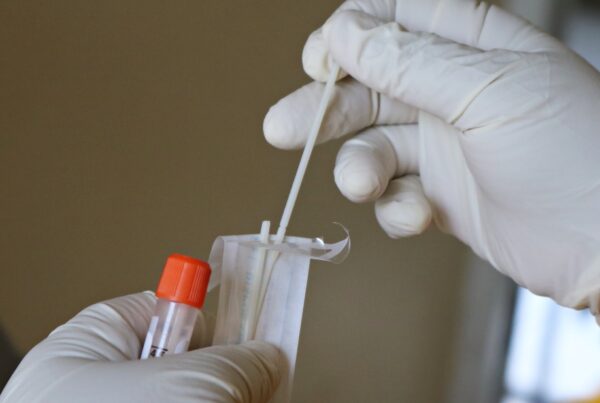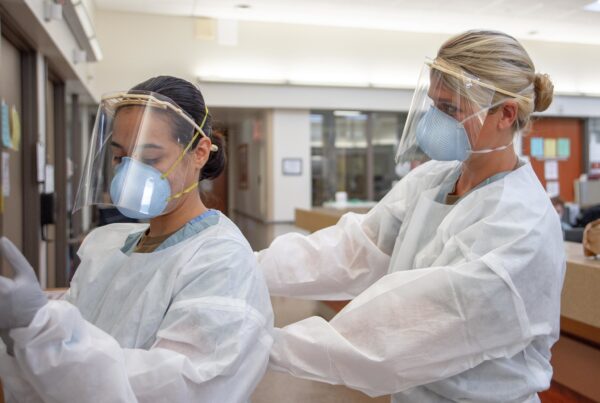Two governors announced their states would be lifting their respective mask mandates. Meanwhile, in the United States, healthcare workers continue to ration personal protective equipment (PPE), revealing an ongoing healthcare crisis caused by issues in the supply chain.
The Big Picture
An update on the number of cases and deaths from the coronavirus: As of Sunday, March 7th, the United States has over 28.7 million cases and 521,000 deaths. North Dakota, South Dakota, and Rhode Island continue to have the highest case rates (cases per 100,000 people), while large states like California, Texas, and Florida have the highest total number of cases.
Lifting Mask Mandates
As case numbers drop, pandemic fatigue has begun to take hold, both Texas and Mississippi announced the removal of their mask mandates last week. Governor Greg Abbott of Texas declared that Texas would fully open by March 10th, allowing businesses and restaurants to open to 100% capacity. “Covid still exists, but it is clear from the recoveries, from the vaccinations, from the reduced hospitalizations, and from the safe practices that Texans are using, that state mandates are no longer needed,” stated Governor Abbott. Right after this announcement, Governor Tate Reeves of Missippii announced they would remove the statewide mask mandate by this upcoming Wednesday.
As more states begin to rollback on restrictions, health experts are warning this is not the right move. “At this level of cases with variants spreading, we stand to completely lose the hard-earned ground we have gained,” said CDC Director Rochelle Walensky. The near-universal message from health experts is that now is not the time to ease up on restrictions such as mask mandates. While cases may be going down, they can just as easily rise.
Flawed PPE Rules
The PPE crisis is a worldwide issue, and recently, nurses in the UK are speaking up on “fundamentally flawed” hospital PPE guidelines. Current guidelines use old WHO data that understates the ability of aerosol spread. As a result, hospitals are only required to provide the highest grade PPE in high-risk settings, and individual hospitals can choose to only provide high-quality PPE to certain members of their staff. Since then, evidence has shown that droplets of the virus can easily spread in poorly ventilated rooms through coughing, talking, etc.
In the United States, similar reports of healthcare workers having little access to PPE are still surfacing. Oftentimes, nurses are not prioritized in PPE distribution, and many healthcare workers are forced to ration their N95 masks.
Fixing the Supply Chain
Last month, Harvard Business Review published recommendations to avoid the same supply chain shortages we see in the PPE crisis.
- “Respond to offers to help in a coordinated way”– in order to establish effective communication strategies between healthcare facilities and PPE suppliers, facilities should create a designated point-of-contact for all PPE inquiries. With one staff member handling all incoming inquiries about PPE need, hospitals can maximize their chances of obtaining the right type of PPE they currently need.
- “Document and vet equipment designs to ensure quality”– currently, not all PPE must be approved by the FDA, which creates an opening for inexperienced and new suppliers to enter the market. To ensure these suppliers can meet industry standards, platforms that provide and vet PPE designs are essential. Open Source Medical Supplies (OSMS), has already begun to do this.
- “Identify alternative suppliers before they’re needed”– When maker groups began creating PPE at the beginning of this pandemic, they were often not in touch with facilities in need. Healthcare facilities should try and create connections with a variety of suppliers and distributors that they can turn to in the face of an emergency.
- “Hold disaster-preparation drills that test supply availability”– including suppliers in these drills is a vital step for hospitals to determine how their supply and communication chains would work in the event of an emergency like the PPE crisis.
- “Cut the red tape that prevents facilities from paying for supplies”– the payment standards and practices normally used by hospitals are often lengthy. While this is usually a positive thing, it slows down both suppliers and facilities during a crisis. Long billing periods and difficult billing restrictions prevent facilities from obtaining PPE. During times of crisis, these procedures should be removed to ensure a quick transition of PPE from the supplier to those in need.
This Week at Get Us PPE
Dr. Megan Ranney, co-founder of Get Us PPE, wrote a CNN article about the health risks at the 2021 Olympic games. She explained that the currency precautions in place do not do enough to protect athletes and spectators. While doing things like having temperature checks and banning public transportation are good steps, they do not outweigh the risk of disease. In the past, the Olympics have spread viruses and bugs, and the rise of new variants around the globe makes these games even more dangerous. Dr. Ranney states that the Olympics “deserve to go on,” but mandating COVID-19 vaccinations and limiting the games to only athletes are two precautions that must occur before that happens.
Dr. Ali Raja, co-founder of Get Us PPE, spoke to Yahoo Finance about new COVID-19 vaccines. He explains that Merck announcing they will help Johnson & Johnson produce their vaccine is extremely promising. “ I haven’t seen this kind of cooperation before,” says Dr. Raja. With multiple companies around the world pitching in to develop and distribute vaccines, there is hope we can start vaccinating people faster. However, Dr. Raja also stated that ramping up vaccine distribution relies heavily on the supply chain, which can be unpredictable.
Dr. Shikha Gupta, executive director of Get Us PPE, was on Signal Boost, the only feminist morning show in America. She discussed the significance of her TIME100 Next feature, how Get Us PPE will progress and grow, and need for comprehensive and transparent data around PPE shortages and PPE production. Listen to Dr. Gupta’s full conversation here.




